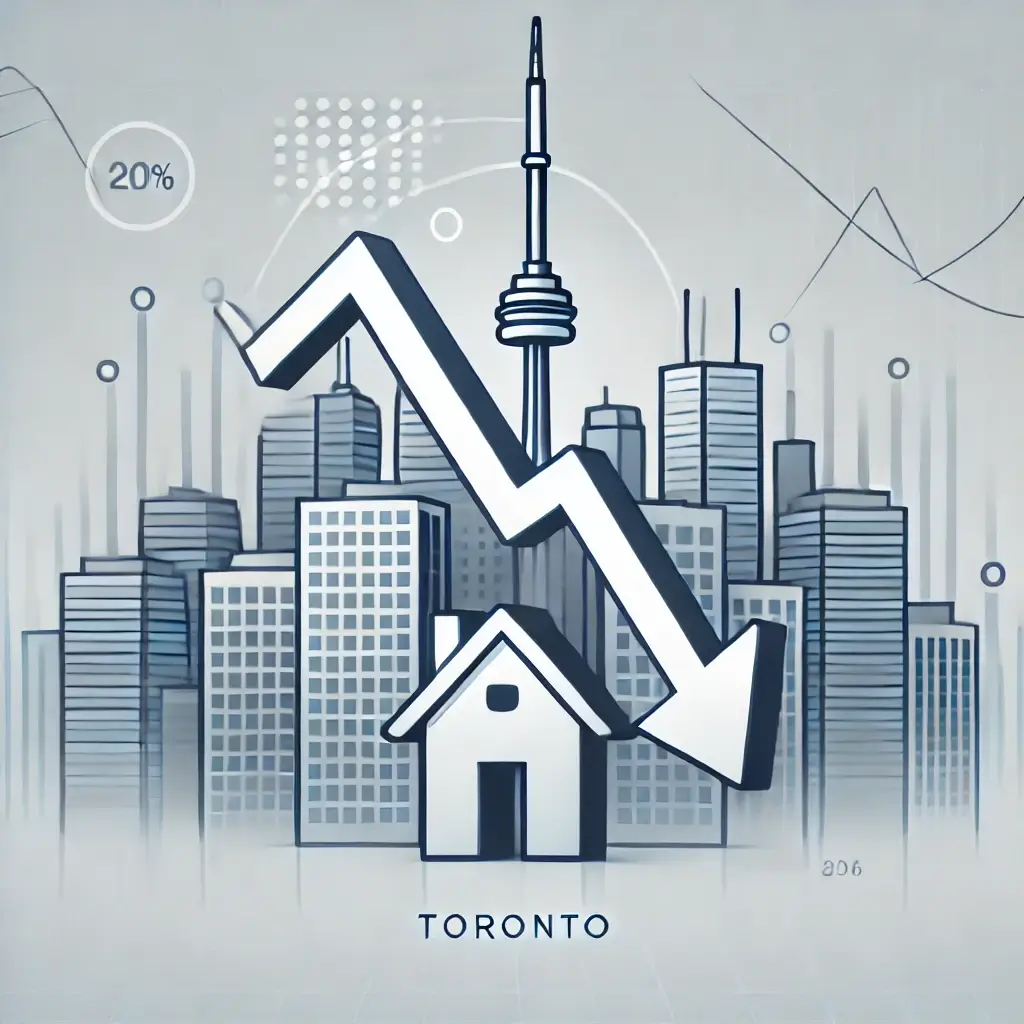Toronto’s real estate market, often considered a bellwether for Canada’s housing trends, saw a notable decline in home sales at the close of 2024. With December marking a five-month low in sales activity, many are wondering what this means for the city’s housing market and the broader economic outlook for 2025. This blog will delve into the data, analyze the factors behind this decline, and explore what it means for buyers, sellers, and investors navigating these uncertain times.
The Numbers: A Snapshot of Toronto’s Decline
December 2024 Sales
- Total Home Sales: 5,359 units sold in December, an 18.7% decrease compared to November 2024.
- Year-Over-Year Comparison: Sales were down 6.8% compared to December 2023.
- Average Selling Price: The average home price reached $1,117,600, reflecting a 0.8% decline from the previous year.
2024 in Review
- Annual Sales: Total home sales for 2024 rose slightly by 2.6% year-over-year, totaling 67,610 units.
- New Listings: The market saw a 16.4% increase in new listings, creating a surplus of inventory.
While these figures show a mixed picture, the December decline has raised concerns about the direction of Toronto’s housing market.
Factors Behind the Decline
1. High Borrowing Costs
The Bank of Canada’s aggressive interest rate hikes in 2022 and 2023 significantly impacted affordability. Despite some rate cuts in mid-2024, the cumulative effect of higher rates continues to deter buyers:
- Example: A family looking to purchase a $1 million home at a 5.5% interest rate faces monthly payments of nearly $5,200—significantly higher than pre-2022 levels.
- Case Study: A prospective buyer in Scarborough postponed their purchase after realizing that even with a 10% down payment, monthly costs were unsustainable at current rates.
2. Seasonal Slowdown
The real estate market typically slows in the winter months, as fewer buyers and sellers are active during the holiday season. However, December 2024’s drop was steeper than usual, indicating deeper market challenges.
3. Affordability Crisis
Toronto’s affordability crisis continues to push many potential buyers out of the market. High home prices combined with stagnant wages have left many unable to save for a down payment or qualify for a mortgage.
4. Economic Uncertainty
Concerns about a potential recession in 2025 have also made buyers cautious. Many are holding off on large purchases until there’s more clarity about the economy and interest rate trends.
Impact on Buyers
For buyers, the current market presents both challenges and opportunities.
Opportunities
- Less Competition: The decline in sales has eased competition, with fewer bidding wars and more negotiating power for buyers.
- More Inventory: The increase in new listings has created a surplus of inventory, giving buyers more options to choose from.
Challenges
- Higher Carrying Costs: Despite falling prices, higher interest rates have increased monthly mortgage payments, offsetting affordability gains.
- Tighter Lending Standards: Lenders have become more cautious, making it harder for buyers to qualify for mortgages.
Tip for Buyers: Use tools like the Taya Real Estate Mortgage Calculator to understand how different interest rates and home prices affect your monthly payments.
Impact on Sellers
For sellers, the market dynamics have shifted significantly.
Challenges
- Longer Time on Market: Homes are taking longer to sell, with average days on market increasing across most neighborhoods.
- Price Adjustments: Sellers may need to lower asking prices to attract buyers, particularly in areas with a surplus of inventory.
Opportunities
- Targeted Marketing: Sellers with unique properties or homes in desirable locations (e.g., near transit or schools) can still attract strong interest.
- Staging and Presentation: Investing in home staging and minor upgrades can help properties stand out in a competitive market.
Case Study: A seller in Vaughan spent $5,000 on staging and landscaping, resulting in multiple offers and a final sale price $20,000 above the original list price.
Impact on Investors
The current market also has implications for real estate investors, particularly those focused on rental properties or flipping.
Opportunities
- Increased Rental Demand: High borrowing costs have kept many out of the buying market, leading to increased demand for rentals.
- Potential Bargains: Investors with cash or access to low-interest financing can take advantage of lower prices and motivated sellers.
Challenges
- Market Uncertainty: Falling prices and economic concerns make it harder to predict future returns.
- Higher Financing Costs: Investors relying on leverage may find deals less lucrative due to elevated interest rates.
Neighborhood Trends
1. Downtown Toronto
- Trend: Condo sales have slowed significantly, with many units sitting on the market for months.
- Insight: Buyers are prioritizing space over location, making downtown less attractive for families.
2. Suburban Hot Spots
- Trend: Areas like Milton, Oshawa, and Brampton remain popular due to relatively affordable prices and larger homes.
- Example: A detached home in Milton recently sold for $950,000, attracting multiple offers despite the broader market slowdown.
3. Luxury Market
- Trend: High-end properties are less affected by borrowing costs, as buyers in this segment are often less reliant on financing.
- Insight: Luxury homes in Forest Hill and The Bridle Path continue to command premium prices.
What to Expect in 2025
Optimism for Rate Cuts
The Bank of Canada is expected to implement further rate cuts in 2025, which could stimulate demand and revive sales activity.
Government Initiatives
Programs aimed at improving housing affordability, such as incentives for first-time buyers and increased funding for new developments, could help address structural issues in the market.
Focus on Affordability
Sustained efforts to increase supply, combined with softer demand, may gradually ease Toronto’s affordability crisis.
Final Thoughts
The decline in Toronto home sales reflects a market grappling with high borrowing costs, affordability challenges, and economic uncertainty. However, this slowdown also presents opportunities for strategic buyers, sellers, and investors to navigate the market with informed decisions.
Understanding these dynamics is essential for anyone involved in Toronto real estate. Whether you’re buying, selling, or investing, staying informed about market trends is key to success. For personalized advice and expert insights, visit Taya Real Estate and explore tools like our mortgage calculator to plan your next move with confidence.








